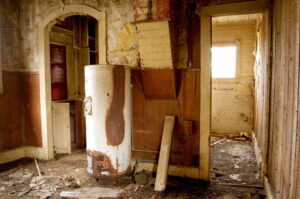 If you have a standard storage tank water heater, you probably know that rust isn’t something you want to see developing on it. Rust is the major enemy of metal that comes into contact with water, and it quickly weakens the metal until it turns useless.
If you have a standard storage tank water heater, you probably know that rust isn’t something you want to see developing on it. Rust is the major enemy of metal that comes into contact with water, and it quickly weakens the metal until it turns useless.
The good news about rust on a water heater is that all water heaters are specially designed to resist rust and other types of corrosion. Proper maintenance for a water heater will make it unlikely for corrosion to appear until late in the unit’s service life. Below we’ll explain more about rust (and corrosion) vs. your water heater and what you may need to do in case it happens.
Your Water Heater’s Defenses Against Rust
Corrosion (of which rust is one type) occurs when metal and water are in contact in the presence of oxygen. A water heater is built to limit these effects so rust has little opportunity to get a hold on the unit for many years.
The first line of defense your water heater has is a glass-lined tank that keeps water from coming into contact with the metal on the outside of the tank. Second, it has a pressure relief valve on top of it to serve as an air cushion against rises in water pressure but prevents the air from actually coming into contact with the water. (Older water heaters used a cushion of air in the tank itself, but this helped to promote corrosion.)
Finally, the water heater has a special weapon against corrosion called the sacrificial anode rod. This is a rod made of two types of metal that extends from the top to the bottom of the tank. The rod attracts oxidation ions to it rather than the other parts of the water heater, causing it to rust and corrode first. In essence, it “sacrifices” itself to rust to save the rest of the water. However, if the anode rod rusts completely, it won’t be able to protect the water heater. This is one of the many reasons to always schedule regular water heater maintenance: technicians will catch when the anode rod needs replacement.
When Rust Does Start to Appear
If you see rust on your water heater, does that mean the unit is finished and it’s time to look into new water heaters in Libertyville, IL? Yes, this is often the case. Rust on a water heater tank usually cannot be cost-effectively repaired. If you see reddish discoloration coming from the hot water taps in the house, this likely means the water heater has rusted all the way through and it needs a replacement right away.
However, if rust only appears on components that can be replaced, such as the heat exchanger, you may not need a new water heater. Talk about the options and different costs with one of our technicians; they’ll help you find the answers you need about your water heater’s future.
Reliance Plumbing Sewer & Drainage, Inc. serves the Northshore and Northwest Chicagoland. Call us for water heater service.
